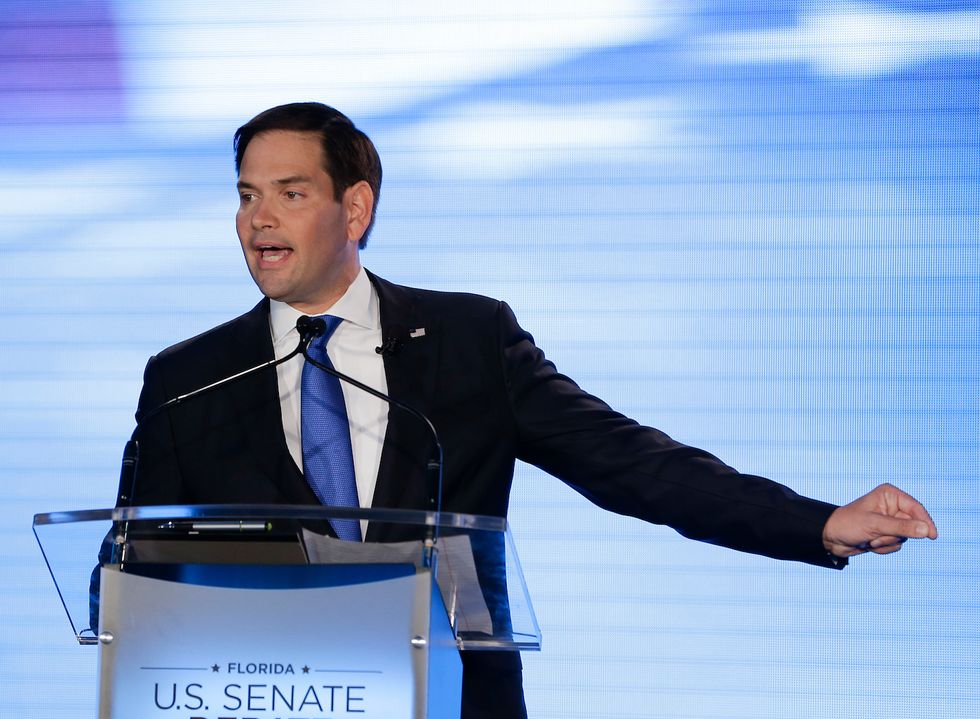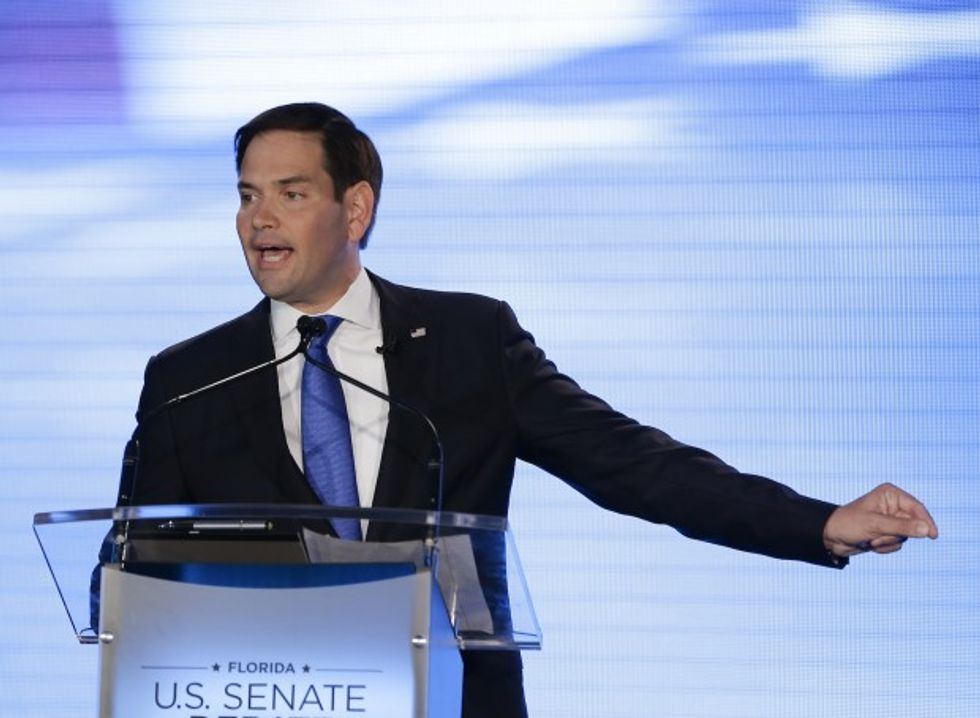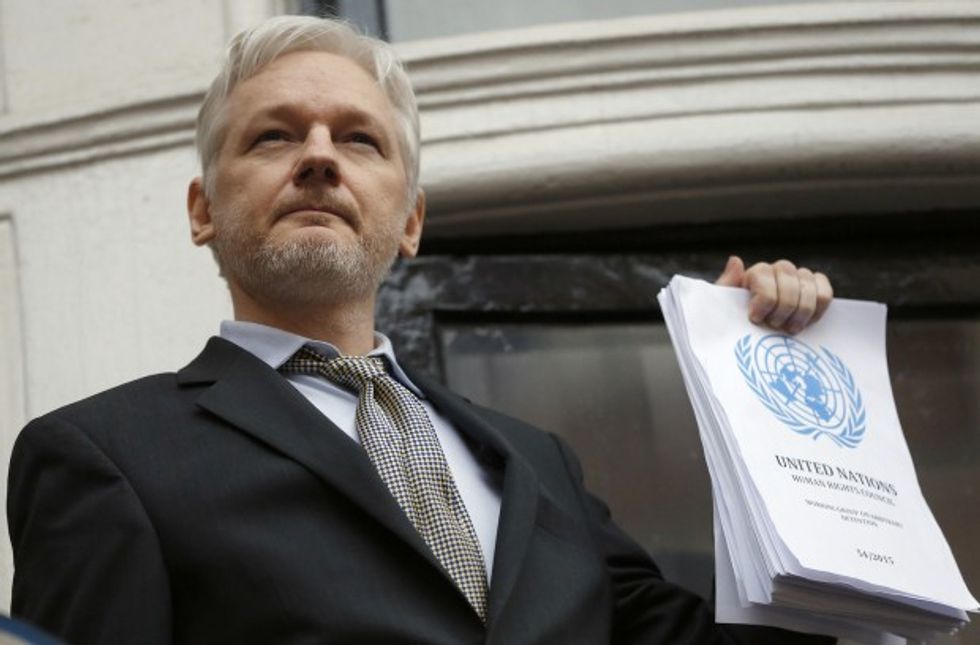
Sen. Marco Rubio, R-Fla. makes comments during a debate with Rep. Patrick Murphy, D-Fla., at the University of Central Florida, Monday, Oct. 17, 2016, in Orlando, Fla. (AP Photo/John Raoux)

Sen. Marco Rubio (R-Fla.) is in a lonely position right now for an elected Republican. Mired in a tough re-election battle against Democratic challenger Patrick Murphy, Rubio has decreed unequivocally that he will not pick up or use the most effective weapon Republicans have at hand in their increasingly uphill battle against Hillary Clinton and the Democrats: documents published by the controversial site WikiLeaks.
Even Republicans like Rubio who have been extremely reluctant to support GOP presidential nominee Donald Trump cannot help but notice that Trump's current self-immolation is affecting their electoral chances. Rubio himself has seen his lead over Murphy shrink to two points in the most recent Quinnipiac poll. The Florida Secretary of State's Office has indicated that Democrats have recently taken the lead in absentee ballots returned in Florida, which is an ominous sign for Republicans statewide. Whatever Rubio privately thinks about Donald Trump, it's in his interest for Trump to remain competitive with Clinton, at the very least.
Right now, the only thing that makes that even remotely possible is the steady leak of explosively damaging material published by WikiLeaks — material obtained, most likely, from hackers working for the Russian government. Regardless of the source, there is a reason that Rep. Jeff Duncan (R-S.C.) recently tweeted, "Thank God for WikiLeaks." Without WikiLeaks reminding the world on a daily basis of the corruption and deceit endemic in the Clinton world, there's no telling where the bottom might be for Trump — and, by extension, all the other Republicans who are up for election in less than three weeks.

From a political standpoint, it's easy to see why Rubio is standing virtually alone on an island, sounding an alarm about a problem that no other Republican is inclined to touch with a 10-foot pole: What sort of precedent are we setting here? Whatever benefit WikiLeaks might be for Republicans in the short term, what sort of future are we creating for our democracy in the future?
After all, it's worth noting that WikiLeaks is not a friend to the interests of the United States. Prior to their current propaganda campaign on behalf of Donald Trump, they were mostly involved in the business of leaking damaging military and diplomatic secrets to America's enemies. They have been an active agent opposing United States foreign policy at every turn since their inception. We ought to think long and hard about the implications of grasping so eagerly at information spoon-fed to us by such an institution.
I do not mean to imply that reporting or commenting on such information is in some way immoral or wrong. At this point, the information is in the public domain, it appears to be authentic, and the information contained therein is without question newsworthy. My point is merely that creating or disseminating fake information is not the only way to mislead people; as any skilled attorney can tell you, you can paint whatever picture you want, using only undisputed facts, by simply omitting other relevant or true facts that are in your possession. And an organization that is completely unbound by any ethics or oversight (like WikiLeaks or the Russian hackers who are supplying them) is especially likely to withhold exculpatory evidence in their possession if it suits their purposes.
Sure, some of the emails in John Podesta's inbox look bad. Some, undoubtedly, are bad. But who knows what other information might exist in the world that would form a more complete picture of its contents?

And for that matter, are we to believe that the hackers who provided the contents of Podesta's inbox to WikiLeaks were either unable or uninterested in accessing the contents of email inboxes belonging to Trump campaign staffers? Could you even imagine what we might be discussing right now if Steve Bannon's or Katrina Pierson's emails for the last two years were in the public domain? Could you imagine what might be revealed if confidential Trump Foundation documents were displayed to the public or if Trump's tax returns were splashed on the front page of WikiLeaks? Just given what we know about what Trump and his campaign operatives have said and done publicly, there's every reason to believe that the contents of their private email inboxes would almost certainly be more politically damaging than the contents of Podesta's. The strong possibility that a foreign power has decided to release one but not the other ought to throw up a giant, huge, blinking red flag for all of us.
Obviously, the fact that Russia might prefer President Trump to President Clinton doesn't necessarily mean that we shouldn't, too. But it ought to be concerning to us all that the American public is going to the voting booth and making decisions on the basis of asymmetric information that was acquired illegally by a hostile foreign power and (almost certainly) selectively released, and we should at least acknowledge the dangerous territory into which we are all treading right now.
The bottom line is that democracies have to have secrets, too. Obviously, it is a point of pride that we require our government to be significantly more transparent than the authoritarian regimes with which we regularly find ourselves in conflict. However, even the most transparent democracy in the world requires some level of privacy and secrecy to operate, and to defend itself from both foreign and domestic threats. Should that extend to pay-to-play between the Clinton Foundation and the Clinton State Department? Obviously not.
On the other hand, every person in any position of authority — especially positions of high authority in our behemoth federal government — depends on honest, frank advice from trusted subordinates to function. Giving credence to the selectively released WikiLeaks documents and crucifying functionaries based on the contents therein can only serve to chill the flow of honest advice and strategic assessments to the higher echelons of government, which means that our government will without a doubt not function as well as it otherwise should.
Which of course is exactly what WikiLeaks is trying to accomplish. An efficiently functioning United States government that effectively pursues its foreign policy goals is exactly what WikiLeaks is trying to destroy, and its entire history as a site speaks to that end goal. And make no mistake, if Trump is elected on the strength of these WikiLeaks revelations, then Julian Assange and crew will immediately begin to undermine whatever foreign policy goals he might attempt to pursue in America's interest, just as they have done since their inception.
I don't know what the right path forward is for us as a country with respect to these WikiLeaks document dumps. Obviously, we at TheBlaze have reported on their contents here when those contents are newsworthy and will continue to do so. But Marco Rubio is right to sound the alarm about where we are headed and to remind us all that the information we are being fed might well be leading us by the nose to an erroneous conclusion.
Leon Wolf
Former Managing Editor, News